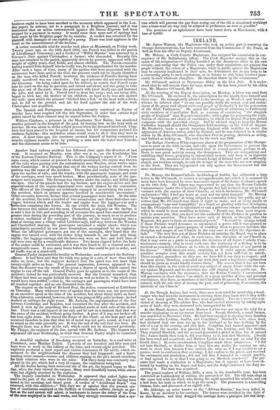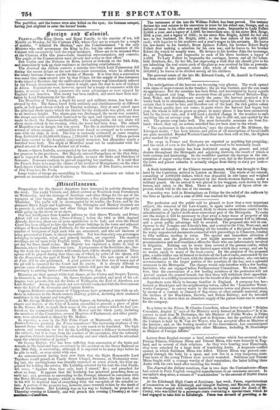IRELAND.
Mr. James Watson, the Magistrate who took an active part in renewing the Orange demonstrations, has been removed from the Commission of the Peace, as well as from his office as Deputy-Lieutenant.
Mr. Molony, a Cork County Magistrate, has resigned his commission in con- sequence of the Ballinhassig affray. The Cork Reporter assigns this as the cause of his resignation—" keeling horrified at the disastrous affair in his own vicinity, and seeing that the Police can, under their regulations, act against the people without the orders of a Magistrate, while in public opinion the Magistrate may be unjustly implicated in their acts, he determined not in any form to be a concurring party to such regulations, or in future to risk being involved inno- cently in such wholesale slaughter. He therefore threw up the commission."
Mr. O'Connell arrived at Darrynane Abbey on the 31st July. It is under- stood that he will remain there for sonic weeks. He has been joined by his eldest son, Mr. Maurice O'Connell, M.P.
At the meeting of the Repeal Association, on Monday, 'a letter was read front Mr. O'Connell. He enclosed 41., the subscription for the month from himself and three sons. He triumphantly alluded to the meetings at Westin-1 and Galway; whence he inferred that "no one can possibly doubt the ardent zeal and enthu- siasm of the great and almost universal people of Ireland (!) for the restoration of the Irish Parliament." He urged the necessity, of returning to Parliament sixty members of Conciliation Hall, as a means of convincing "the sluggish people of England" that Repeal is inevitable; with a plan for promoting the regis- tration of electors and choice of candidates, in which the Repeal-Wardens should cooperate with the parochial clergy. And he advised steps to keep the Roman Catholics tranquil should the Orangemen hold meetings on the 12th of August. Mr. Broderick made a speech taunting England with inability to resist the aggression of America unless aided by Ireland; and he was followed in a similar strain by Mr. John O'Connell, who described Peel as prating, America as acting, and Ireland as looking on. The rent for the week was 2681.
The Belfast Northern Whig expresses alarm at the preparations of the Orange- men to meet on the 12th instant, and calls upon the Government to prevent the proposed musterings. " We understand that in several quarters, perhaps in all, there is now great activity among the Orangemen. They are reorganizing and redrilling their forces, preparing to extend their system, and keep it in vigorous operation. The members of the old Grand Lodge of Ireland were not sufficiently stanch, not reckless enough, to suit the temper of the men who are now stepping to the front. They are exasperated not only against the Government but the more moderate Orangemen."
Dr. Murray, the Roman Catholic Archbishop of Dublin, has addressed a long letter to Mr. O'Connell, to correct a misapprehension into which it is assumed ho must have been betrayed by some inaccurate report of Sir James Graham's speech on the 18th July. Sir James was represented to say that the Roman Catholic Commissioners under the Charitable Bequests Act had declared that act to be at variance with the canons of their Church; at which declaration Mr. O'Connell exclaimed—" Oh! I feel my heart at ease and my mind tranquil." Dr. Murray feels "inexpressible pain" at being obliged to contradict before the public any as- sertion that Mr. O'Connell may think it right to make, and at being unable to communicate "ease and tranquillity" to a heart so glowing with love of religion; but Mr. O'Connell's error is calculated to cast a grievous censure upon character; which he would be most unwilling to defame. Permit me, then, most respect- fully to assure you, that you have not the authority of the Prelates in question to sustain your assertion. They have never said, or hinted, or thought, that the Bequests Act gave to them an uncanonical power." "It would be strange indeed if those Prelates would denounce as uneanonical a power which was granted to them for the sole and express purpose of enabling them to preserve inviolate the discipline and usages of our Church in the very case to which the objections al- lude." "The very first act of those Prelates on entering the Board, was to place on record a declaration of what, in such cases, the discipline of our Church is, that it may serve as a guide to regulate the decisions of all future Catholic Com- missioners—namely, that in every such case the testimony of a Bishop is to be received as conclusive evidence as to who is the rightful pastor of any parish ia. his diocese." "Still there are some, surprising as it must appear, whose over- sensitive scruples even this ample security has not been sufficient to satisfy. Those scruples, groundless as they are, we have felt it our duty to respect; and we have never, therefore, concealed our wish that such a legislative explanation should be given as would wholly remove them." The reason that it has not been done this session is, the wish to avoid any subject of angry debate while the out- cry against Maynooth and its doctrines was still ringing in the public ear. Dr. Murray concludes with the assurance, that the Roman Catholic Commissioners will persevere in those duties "on which, at a great sacrifice of time and personal convenience, they have, as members of the Charitable Bequests Board, deliberately entered, with the sole view of serving the poor, and of protecting, if necessary, the interests of our Church."
At the Nenagh Assizes, last week, three men were tried for murdering a wood- ranger who had been the instrument in evicting them from lands which they held: one was found guilty, but the others were acquitted. Two men were also con- victed of shooting at Theophilus Roe, who had excited animosity by taking eight acres of land: they were sentenced to be transported for life.
At the Meath Assizes, lest week, Mathew Leckin was put upon his trial for a murder originating in an ejectment from land. Joseph Sherlock, a small farmer, was murdered in December 1843. He had been engaged in ejecting three families of cottiers—the Leckins, Smiths, and Coughlans. Sherlock's wile, since dead, had declared that one man ran up to her husband as he was walking by the side of a car in the evening, and shot him. Coughlan had turned approver; and swore that the murder was planned by him, two Leckins, and two Smiths. They waylaid Sherlock, and the accused presented a pistol at him, but it missed fire; James Smith then took it, did something to it, and shot Sherlock. [ Smith has been tried and acquitted; and Mathew Leckin was now put on trial for the fourth time.] In cross-examination, Coughlan made these admissions. "I did not hate Sherlock, or dislike him, or bear him any malice for turning me out; went to shoot him because I was invited, the same as if I was invited to eat a potato; went to confession that morning: I did confess to the priest, and received the sacrament and absolution; did not tell him I intended to commit murder, or had agreed to it, or that I was going to see Sherlock murdered." The pri- soner had made a confession to a Magistrate; but it appears to have been ob- tained by working on his hopes and fears, and the Judge cautioned the Jury re- specting it. The man was acquitted.
The grand-nephew of William Mills, a man in his hundredth _year, has been convicted at Londonderry of robbing the patriarch of 45/. The old man slept in the same bed with the thief; who during the night assaulted his relative, and cut a belt from his body in which he kept the money. The prosecutor is a travelling tinman, hale, and possessed of an eighth wife.
Mr. Aldridge, an actor known as the "African Roscins," has been killed, hi Kerry, by an accident to his carriage. The horses were terrified by the light of an iron-farnace, and they dragged the carriage down a precipice 120 feet deep. The postillion and the horses were also killed on the spot; the footni.on Lscaped, baying just alighted to seize the horses' heads.



























 Previous page
Previous page